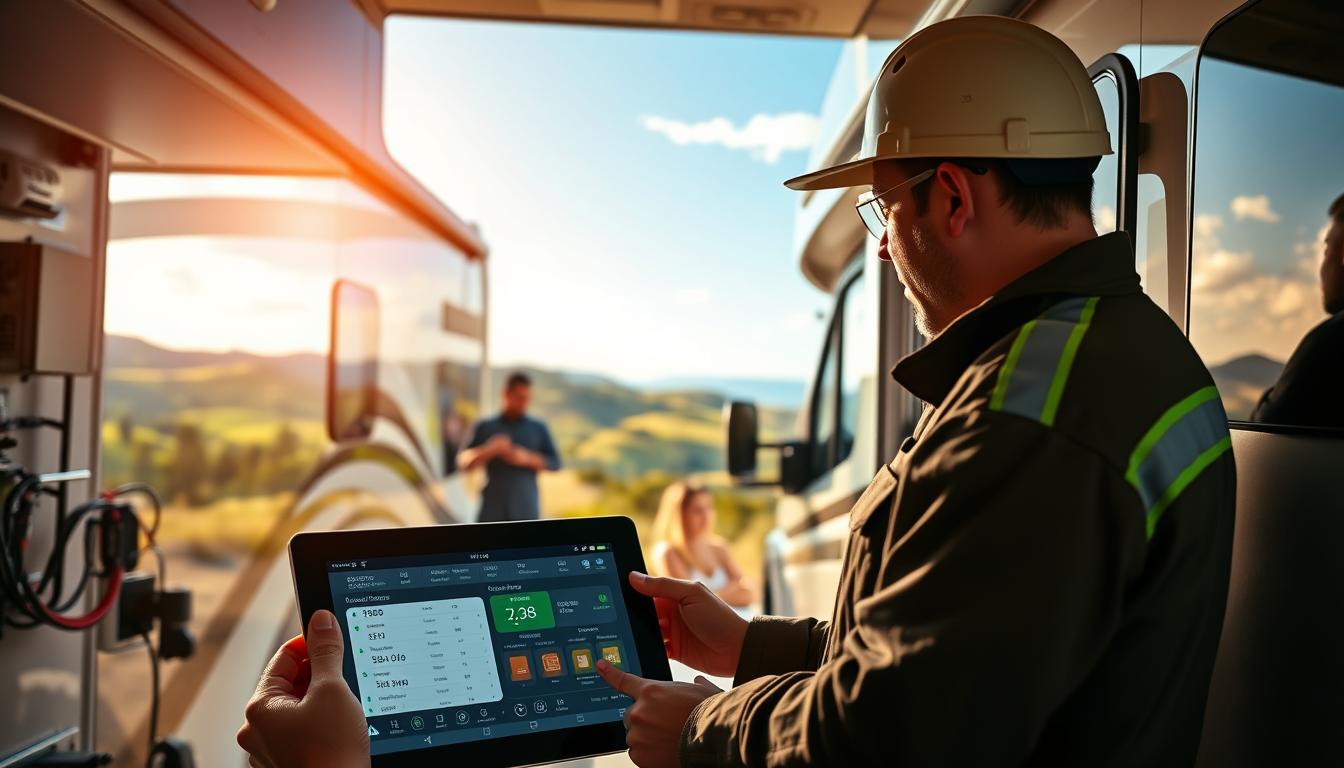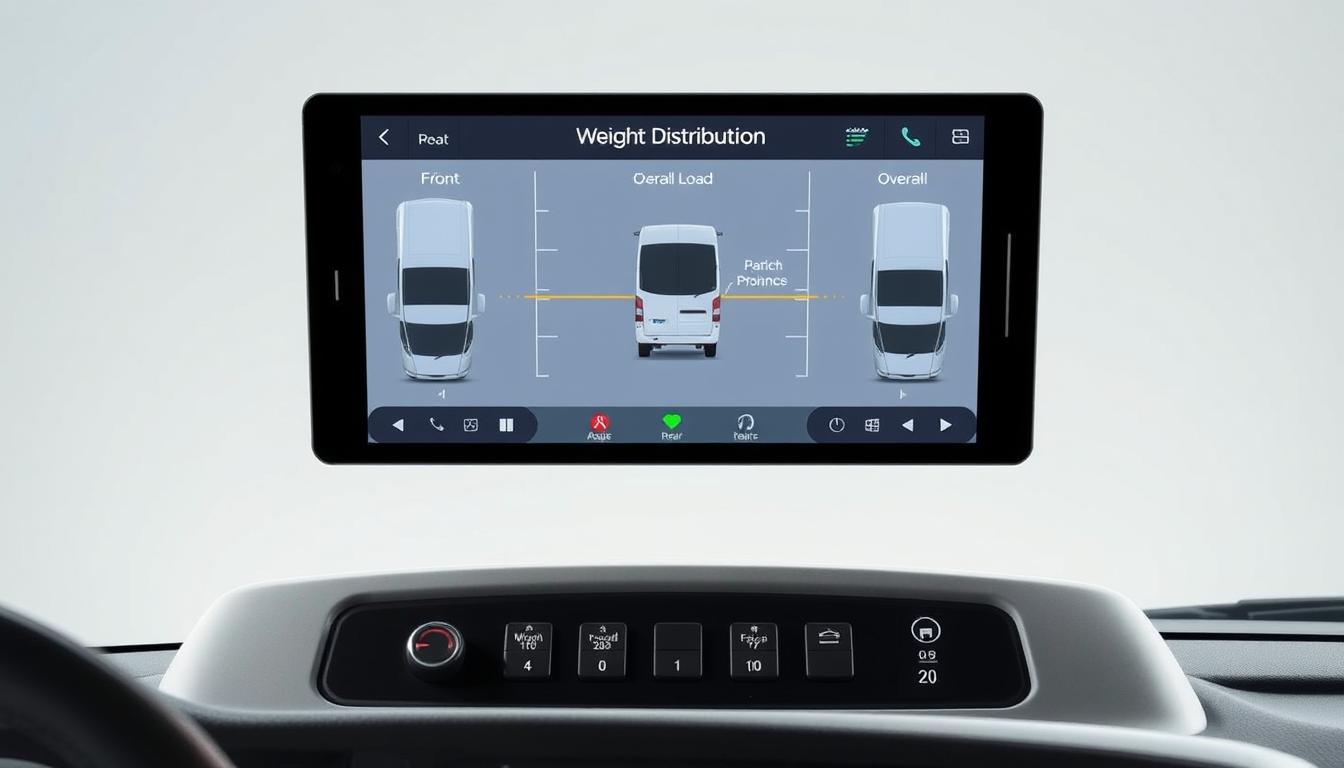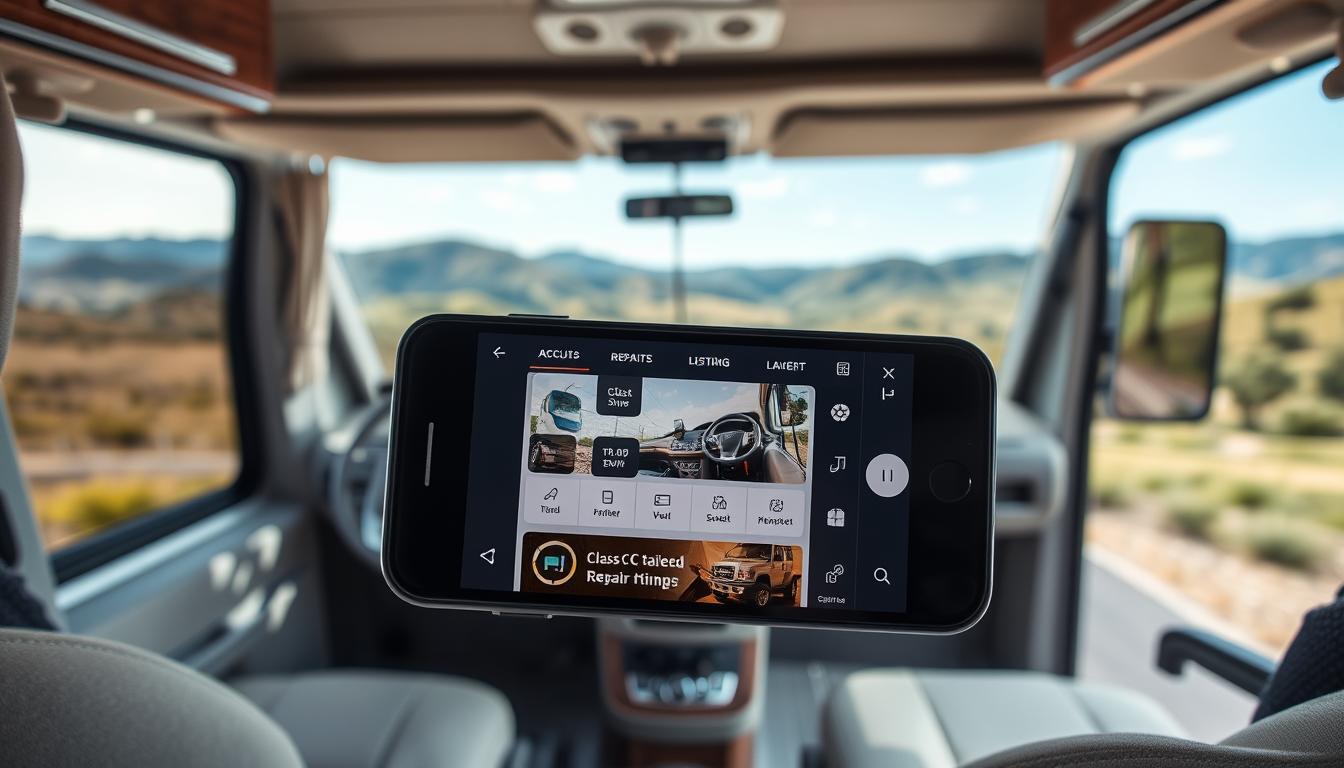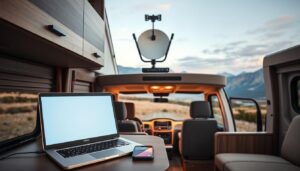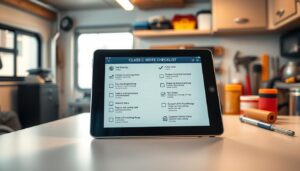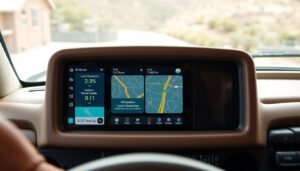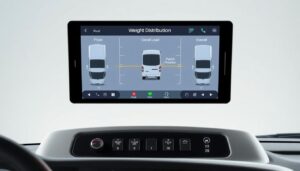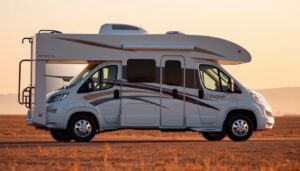Remote monitoring of electrical systems in Class C motorhomes with digital tools
Ever thought about how RV owners can travel freely without worrying about electrical failures? In the world of Class C motorhomes, digital tools for remote monitoring are making a big difference. These tools let owners check on their electrical systems easily, ensuring safety and convenience.
This article will show why remote monitoring is key. It makes the RV experience better and changes how owners manage their vehicles.
The Importance of Remote Monitoring in Class C Motorhomes
Remote monitoring is key for a better experience in Class C motorhomes. It’s crucial for RV safety and the comfort of travelers. These systems give real-time updates on important electrical details, helping avoid failures.
It also helps with energy efficiency. Users can see how much power they use, helping manage resources on trips. Knowing about battery status and power use lets owners make smart choices, ensuring a safe and fun camping trip.
With the right tools, Class C motorhome owners can handle their electrical systems well. This leads to a smoother travel experience. These technologies improve safety and make road trips more enjoyable.

Understanding Electrical Systems in Class C RVs
Class C RVs are known for their comfort and versatility. Their electrical systems are complex and play a key role in a good travel experience. These systems include solar panels, inverters, and battery systems that power lights, climate control, and more.
The battery systems are at the heart of these electrical systems. They provide energy for both basic needs and luxury features. The choice between lead-acid or lithium-ion batteries affects efficiency and performance. Each type has its own benefits, impacting power management during trips.
Solar panels in Class C RVs have changed how we get power. They let owners use renewable energy, making them more self-sufficient off-grid. This reduces the need for generators or shore power, making travel more sustainable.
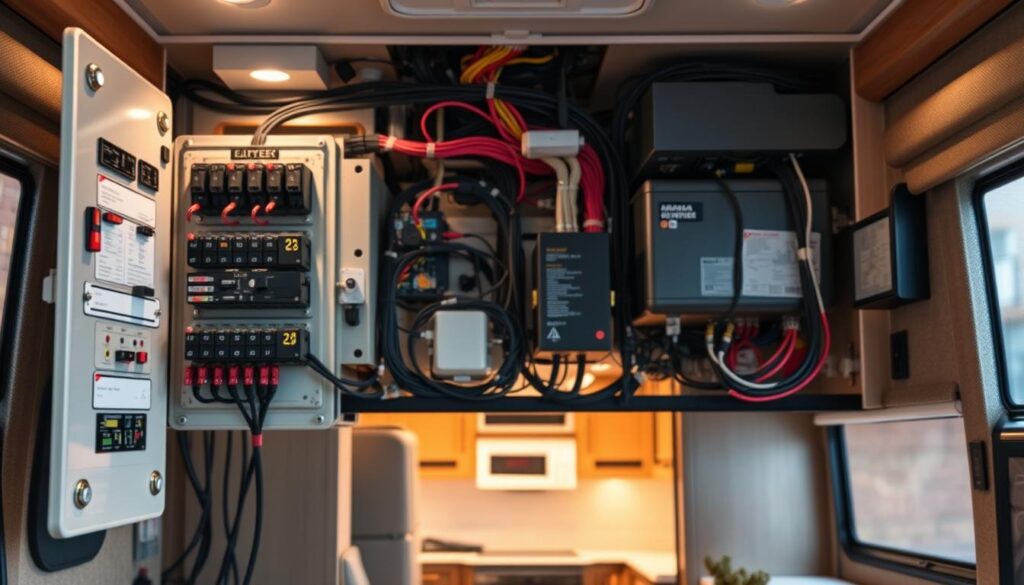
Managing power in Class C RVs keeps appliances and comforts working on trips. Regular checks and maintenance of electrical systems prevent problems. Knowing these systems helps RV owners fix common issues, making travel safer and more enjoyable.
Tools for Remote Monitoring of Electrical Systems in Class C RV
In today’s world, technology and travel go hand in hand. Remote monitoring tools are key for improving Class C RVs. They let owners manage their electrical systems well, keeping everything running smoothly. With tools like Winnebago Connect and Victron Energy’s digital systems, you can see how much energy you use and how your system is doing.
Overview of Popular Tools
There are many tools to make Class C RVs better. Some top picks include:
- Winnebago Connect: This system has smart energy management features. It sends alerts and lets you control your system with a mobile app.
- Victron Energy: Victron is famous for its energy management systems. It gives detailed info on battery performance and energy use.
- Mobile App Integrations: Many devices come with apps. These apps let you see real-time data and make changes from anywhere.
How These Tools Work
Remote monitoring tools for Class C RVs use smart RV tech to show real-time energy data. They connect wirelessly to your phone or tablet. They show things like battery levels, power use, and system alerts.
By letting owners check performance from afar, these tools help make smart energy choices. This can lead to better efficiency and lower costs over time.
Innovations in Solar Power for RVs
Recent advancements in solar power have changed RVs for the better. They make RVs a great choice for those wanting energy independence. New solar panel tech, like monocrystalline and bifacial designs, catches more sun, even when it’s hard to get.
This means RV owners can use renewable energy for longer when they’re off the grid. It’s a big win for those who love the outdoors.
With solar power, RV owners need less from traditional electricity. This move supports green living and changes camping for the better. It lets people explore more without worrying about running out of power.
Integration of Lithium Batteries for Enhanced Performance
Lithium batteries, especially Lithium Iron Phosphate (LiFePO4), are changing RV performance. They are more energy efficient and last longer. This makes them a top pick for today’s RVs.
Benefits of Lithium Iron Phosphate (LiFePO4) Batteries
LiFePO4 batteries beat old lead-acid batteries in many ways. They are lighter, which helps RVs handle better and use less fuel. They also last longer, saving money in the long run.
These batteries pack more power in a smaller space. This means RV owners can get more out of their batteries without taking up too much room.
Benefits of Battery Management Systems
Battery management systems (BMS) are key to getting the most out of lithium batteries. They watch over the battery’s health, keeping it safe and efficient. They prevent overcharging and overheating, protecting the battery.
With a BMS, RV owners can trust their batteries for long trips. They ensure the batteries work well, giving reliable power wherever you go.
Smart Connectivity and Integration
Smart connectivity is changing how RV owners handle their electrical systems. Mobile apps are key in this change, offering tools for managing electrical systems. With apps like Victron Energy’s, users can easily manage power, check battery status, and track energy use from their devices.
Mobile Apps for Managing Electrical Systems
Mobile apps make it easy to monitor and control RV systems. These apps help manage electrical parts, making energy use more efficient. Users get updates on battery health and alerts to prevent problems.
This smart integration helps RV owners make better decisions. It ensures their RVs run well on trips.
Case Studies of Successful Implementations
Many case studies show how smart connectivity works in real life. RV owners have cut energy use by using mobile apps to manage their systems. For example, one owner used these tools to make their battery last 30% longer.
This made their travels more enjoyable and stress-free. These stories show how smart connectivity can improve the RV lifestyle.
Power Management Features in Class C RVs
Class C RVs come with advanced power management features. These features make energy use more efficient and electrical systems better. They help distribute power smartly, matching it with what’s needed in real time.
For example, Winnebago Connect lets users track how much power they’re using. This tracking helps adjust settings to meet current energy needs. It keeps batteries charged and systems running well, making travel more eco-friendly.
These power management features are a big step towards greener travel. They use energy wisely, helping both the traveler and the planet.
Maintenance and Troubleshooting with Remote Monitoring Tools
Keeping the electrical systems in Class C motorhomes in good shape can be tough. Remote monitoring tools make this easier. They let RV owners see how their systems are doing in real-time. This helps a lot with maintenance.
For instance, tools like Winnebago’s Monitor Assist send alerts about battery levels and water tank status. This keeps users in the loop about their RV’s needs. It makes regular maintenance easier, as users can plan service visits based on the data from these tools.
Dealing with electrical problems gets simpler too. Alerts about odd readings help find issues fast. This means less time waiting and less chance of damage to the RV. It gives RV fans confidence in keeping their vehicles in top shape.
Benefits of Real-Time Data and Notifications
Real-time data and notifications in RV monitoring make life easier for Class C motorhome owners. They get updates on battery status, power use, and system health. This keeps them in the loop about their RV’s electrical systems.
Notifications are key in alerting owners to any issues. This lets them fix problems before they get worse. Alerts go straight to a mobile app or dashboard, keeping owners informed.
Real-time data and notifications give owners peace of mind. They know their RV is working right, so they can enjoy their trips more. These systems set a new standard for Class C RVs, making travel better and safer.
Future Trends in RV Remote Monitoring Technology
New trends in RV tech are changing how we monitor electrical systems from afar. With 5G, data will flow faster and more reliably. This means RV owners can get updates on their systems in real-time.
Artificial intelligence is also becoming a big part of RV tech. It helps predict when something might go wrong, so we can fix it before it happens. This makes our trips safer and less interrupted. Plus, smart home tech is coming to RVs, letting us control our systems from anywhere.
These changes will make tools for monitoring RVs better and easier to use. It’s all about making our RV experiences better and more efficient. And it’s all about meeting our growing need for green and smart travel.
Challenges of Implementing Remote Monitoring Systems
Setting up remote monitoring systems in Class C RVs comes with challenges. The high initial costs can stop people from getting these systems. This is especially true for those looking for affordable options.
Another big problem is the reliability of internet connections. In places far from cities, getting a stable internet connection is hard. This makes it tough for remote monitoring systems to work well.
Getting used to new technology is hard for many RV owners. They might not know how to use these systems. Teaching them how to use these tools can help.
Another issue is making sure all devices work together smoothly. If they don’t, it can cause problems. Fixing these issues is key to making remote monitoring systems useful.
As more people want to use these technologies, solving these problems is crucial. It will make remote monitoring systems more popular and useful. For more info, check out RV technology implementation.
Conclusion
Digital tools for RV remote monitoring have changed how we manage electrical systems in Class C motorhomes. This tech boost makes life easier and safer. It lets RV fans travel without worry.
With real-time monitoring, users can fix problems early. This keeps camping trips smooth and enjoyable.
The RV industry is always getting better. New tech will make traveling even more comfortable and stylish. It will help users be more self-sufficient and green.
By using these tools, RV owners can enjoy their trips more. They’ll have the power to handle their vehicle’s electrical needs.
The future of RV travel is exciting. Technology meets our needs, giving us more freedom and flexibility. It makes our journeys better and lets us manage our electrical systems with confidence.
FAQ
What is remote monitoring in Class C motorhomes?
Remote monitoring in Class C motorhomes lets RV owners check their electrical systems from afar. They can see how much power they’re using and how their batteries are doing. This is all done through mobile apps.
How does remote monitoring enhance safety for RV owners?
It keeps RV owners safe by sending alerts about battery levels and system health in real-time. This helps prevent electrical failures. It also lets owners take steps to stay safe while on the road.
What are the key components of electrical systems in Class C RVs?
The main parts are solar panels, batteries like Lithium Iron Phosphate, inverters, and appliances. These are needed for heating, cooling, and keeping the motorhome running smoothly.
What are some popular tools for remote monitoring?
Tools like Winnebago Connect and Victron Energy’s digital systems are popular. They give detailed info on energy use, battery status, and system controls through mobile apps.
Why are Lithium Iron Phosphate (LiFePO4) batteries used in RVs?
LiFePO4 batteries are safe, last longer, are lighter, and hold more energy than old lead-acid batteries. They’re perfect for RVs because they meet the high demands of travel.
How can mobile apps aid in managing electrical systems in RVs?
Mobile apps help control power management from one place. They let you check battery status, track energy use, and adjust settings for better performance and efficiency.
What power management features are available in Class C RVs?
Class C RVs have smart systems that manage power to appliances wisely. They adjust settings based on energy needs to save battery life.
How do remote monitoring tools assist with maintenance?
Tools send alerts about performance issues, like low battery levels. This lets RV owners fix problems early, making maintenance easier.
What are the benefits of real-time data and notifications in RV usage?
Real-time data and alerts tell owners about battery life, energy use, and system health. This helps them make quick decisions to stay safe and efficient on trips.
What future trends are expected in RV remote monitoring technology?
Future trends might include better 5G connectivity, AI for predictive maintenance, and more integration with smart home tech. These advancements will offer more control and personalization for RV owners.
What challenges exist in implementing remote monitoring systems?
Challenges include the cost of setting up, ensuring reliable connection in remote areas, getting used to new tech, and making sure all systems work together smoothly.
